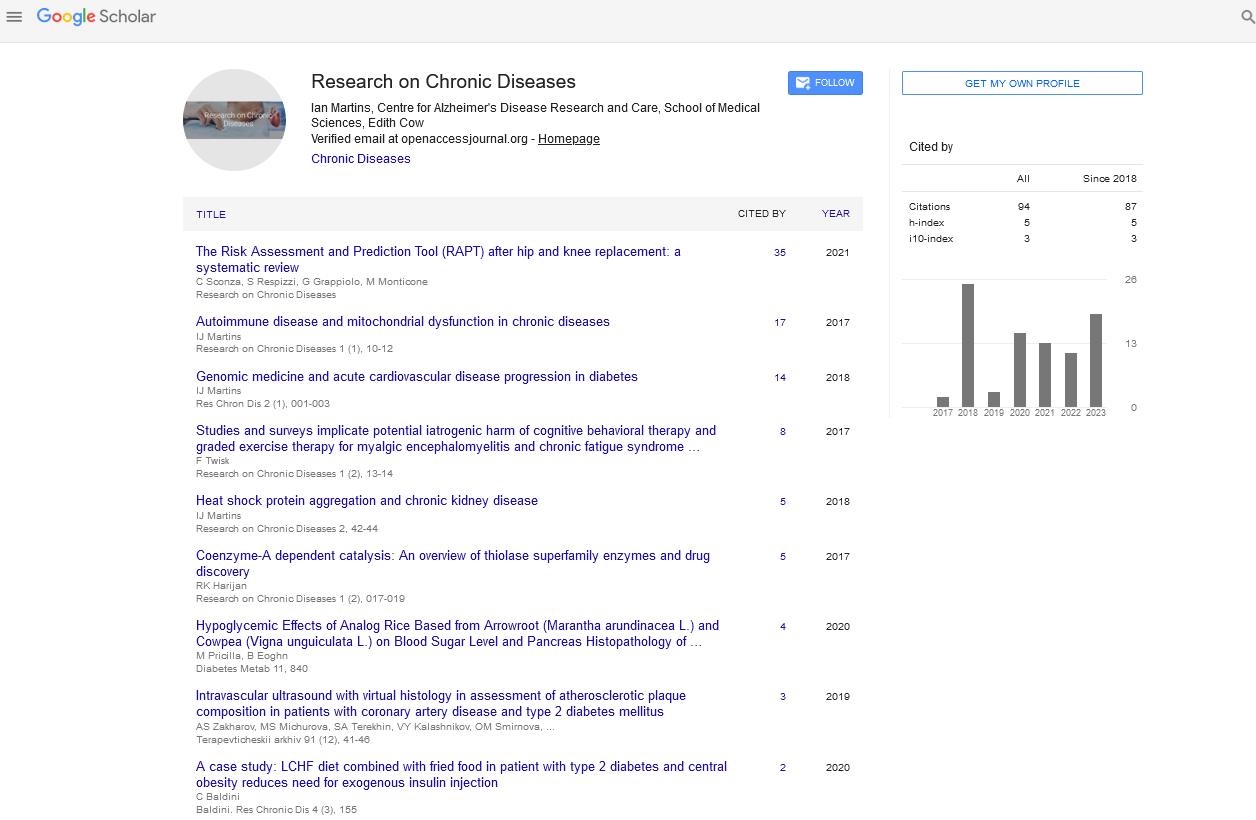Perspective - Research on Chronic Diseases (2024) Volume 8, Issue 6
Inflammatory Bowel Diseases: Causes, Symptoms, and Advances in Treatment
- Corresponding Author:
- Harshit Singh
Department of Nephrology,
Mysore University,
Bangalore,
India
E-mail: Harsghit66@gmail.com
Received: 11-Nov-2024, Manuscript No. oarcd-24-152263; Editor assigned: 14-Nov-2024, PreQC No. oarcd-24-152263 (PQ); Reviewed: 28-Nov-2024, QC No. oarcd-24-152263; Revised: 02-Dec-2024, Manuscript No. oarcd-24-152263 (R); Published: 23-Dec-2024, DOI: 10.37532/OARCD.2024.8(6).244-245
Introduction
This form of IBD can affect any part of the digestive tract, from the mouth to the anus, though it commonly impacts the end of the small intestine (ileum) and the beginning of the colon. Crohn's disease features "skip lesions," meaning that areas of inflammation are often separated by healthy tissue, and it affects the entire thickness of the bowel wall.
Description
Causes and risk factors of IBD
The precise cause of IBD remains unclear, though it is believed to result from an abnormal immune response triggered by genetic, environmental and microbial factors.
Genetics: Family history is a known risk factor; having a close relative with IBD increases one’s risk. Several genes associated with immune function, including the NOD2 gene, are more common in people with IBD, suggesting that genetic predispositions play a role in disease development.
Immune system: IBD is thought to occur when the immune system mistakenly attacks the lining of the intestines, leading to chronic inflammation. This immune response may be triggered by factors in the environment or by the presence of specific gut bacteria.
Environmental factors: Lifestyle and diet can impact the risk of IBD. Higher incidences of IBD are observed in developed countries, suggesting that factors such as pollution, diet and hygiene may contribute. Smoking is associated with an increased risk of Crohn’s disease but is thought to have a protective effect in ulcerative colitis.
Gut microbiota: Recent research highlights the role of gut bacteria in IBD. Changes in the microbiome’s composition, diversity and function may disrupt the gut’s immune tolerance, leading to inflammation.
Symptoms and diagnosis of IBD
IBD symptoms vary widely based on disease location and severity, with common signs including:
• Persistent diarrhea
• Abdominal pain and cramping
• Fatigue and reduced appetite
• Rectal bleeding (more common in ulcerative colitis)
• Weight loss and malnutrition
Symptoms can range from mild to severe and often occur in cycles, with periods of flare-ups followed by remission.
Diagnosis process
Diagnosing IBD involves a combination of clinical evaluation, laboratory tests and imaging studies:
Blood tests: These tests help detect markers of inflammation, such as elevated white blood cells or C-Reactive Protein (CRP).
Endoscopic procedures: Colonoscopy and sigmoidoscopy allow visualization of the colon’s lining, with biopsies confirming the diagnosis and type of IBD.
Imaging: Imaging studies, such as MRI and CT scans, provide detailed images of the small intestine and can reveal areas of inflammation and complications.
Innovations and future directions in IBD treatment
Research in IBD is rapidly advancing, with several promising treatments and approaches on the horizon:
Stem cell therapy: Researchers are exploring the potential of stem cells to repair damaged tissue and regulate the immune response in IBD. Mesenchymal stem cells, in particular, show promise in treating Crohn’s fistulas and other complications.
Microbiome therapy: Manipulating the gut microbiome to restore balance and promote a healthy immune response is a growing field. Fecal Microbiota Transplantation (FMT), though still experimental, has shown promise in treating IBD and restoring gut health by introducing beneficial bacteria.
Gene therapy: With advancing knowledge of the genetic mutations associated with IBD, gene therapy may become a viable treatment. Researchers are exploring gene editing technologies like CRISPR to potentially correct defective genes that contribute to IBD.
Living with IBD: Coping and support
Managing IBD can be challenging, affecting various aspects of life, including diet, social activities and mental health. Support groups and counseling can be essential for coping, helping patients manage stress and connect with others facing similar challenges. Patients can benefit from personalized care plans that include psychological support, as well as education on maintaining remission and preventing flare-ups.
With advances in treatment, many people with IBD lead full, active lives. Support from healthcare providers, family and IBD organizations can make a significant difference in managing the physical and emotional aspects of the disease.
Conclusion
Inflammatory bowel diseases present complex challenges due to their chronic nature, fluctuating symptoms and potential for serious complications. However, recent advances in immunology, microbiology and genetic research are bringing hope to patients with IBD. With a combination of medical treatments, lifestyle modifications and supportive care, individuals with Crohn’s disease and ulcerative colitis can achieve meaningful improvements in their quality of life. Continued research is essential to unlock further treatment options and eventually, a cure for these life-altering conditions.
